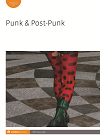- Home
- A-Z Publications
- Punk & Post-Punk
- Previous Issues
- Volume 4, Issue 1, 2015
Punk & Post-Punk - Volume 4, Issue 1, 2015
Volume 4, Issue 1, 2015
-
-
Pay no more than 45 copies: The collection legacy of the Crass Record, Reality Asylum (1979)
More LessAbstractThis article sets out an auto-ethnographic and theoretical account of the journey of 45 collected author copies of the 1979 Crass Record Reality Asylum. The principle aim in this piece is to document and theoretically situate the production, reception and individual journeys various pressing variations of the record have encountered. The theoretical account is concerned with how and what ways various traditions in semiotics, fan/audience research, critical theory and Derrida’s concept of Hauntology can be deployed in explanatory terms to account for the enigmatic, haunted journey of the recorded musical artefact. The article also captures this collection prior to public display, prior to them being resold as the collectable sixth, ‘haunted’ pressing of the record.
-
-
-
‘Shariah don’t like it ...?’ Punk and religion in Indonesia
More LessBy Jim DonagheyAbstractIndonesia boasts one of the largest and most vibrant punk scenes on the planet today. It is also home to world’s largest Muslim population. Punk and religion are usually found in antagonism with one another, but the situation is far more complicated in Indonesia. Using interview and participant-observation material gathered in September/October 2012 and January 2015, this article examines the relationships between punk and religion in Indonesia, finding it markedly different to the oppositional relationship expected elsewhere in the world. Despite the fact that repression of punk in Indonesia is often religiously motivated, most of the interviewees still maintained a Muslim religious (or at least cultural-religious) identity. Those punks who did profess atheism were doing so against a very different social backdrop to their comrades in more secular parts of the world, and were making a much more significant stand in doing so.
-
-
-
Punk and religion in the Republic of Ireland, 1977–1981
More LessAbstractHow did the early punk rock movement challenge the values of the dominant Catholic Church in the Republic of Ireland? How did young people reconcile the apparently opposed beliefs of some punk groups and the Irish clergy? This article explores the complex and often surprising ways in which the Church and punk interacted with each other in the 1977–1981 period.
-
-
-
The anarchist, the punk rocker and the Buddha walk into a bar(n): Dharma Punx and Rebel Dharma
More LessAbstractPunk rock is known for its frenetic energy. Its aggressive, anger-driven music is born from the seething cauldron of discontent. Anarchism is the ‘ideology’ that often underpins punk, but anarchism exists beyond punk in its drive to create a new social order fuelled by discontent at the current systems. There exists a large self-identifying anarchist group within the wider punk subculture, but it is only one group within a myriad of understandings of punk. Not all anarchists are punks; not all punks are anarchists. On first glance, Buddhism, as an ancient practice of mindfulness intended to lead the individual into an awareness of the nature of being through calming activities such as meditation, appears incongruous with anarchism and punk. However, a shift away from understanding Buddhism as a religion and an examination of the purposes behind Buddhism, punk and anarchy reveal a synchronicity. This has culminated in the creation of groups such as the Dharma Punx (US) and the Rebel Dharma (UK), which this article will explore and outline.
-
-
-
Postsecular punk: Evangelical Christianity and the overlapping consensus of the underground
More LessAbstractUtilizing interviews and fieldwork with Evangelical Christians involved in the punk scenes of Australia, Britain, South Africa and the United States, this article brings the study of the punk subculture into dialogue with key political theorists of the regulation of religiously diverse societies. Focusing on the work of the late American political philosopher John Rawls, furnished with more recent work by Jürgen Habermas, this article examines the processes of negotiated inclusion undertaken by Evangelical Christians in local punk scenes. Closely analyzing the acceptance of the contestability of religious claims, ‘translation’ between religious and secular discourses and modalities, and an ‘overlapping consensus’ on the desirability of diversity within the punk scene, it is argued that the negotiated inclusion of religiously diverse social actors in punk scenes can inform ongoing debates about diversity and inclusion in punk scenes’ ‘postsecular’ parent societies.
-
-
-
Exhibition Review
More LessBy Peter JonesAbstractEyes For Blowing Up Bridges: Joining The Dots From The Situationist International To Malcolm Mclaren, Paul Gorman, David Thorp and Fred Vermorel (2015) Southampton: John Hansard Gallery, 96 pp., ISBN: 9780854329915, p/bk, £12.00
-
Most Read This Month


